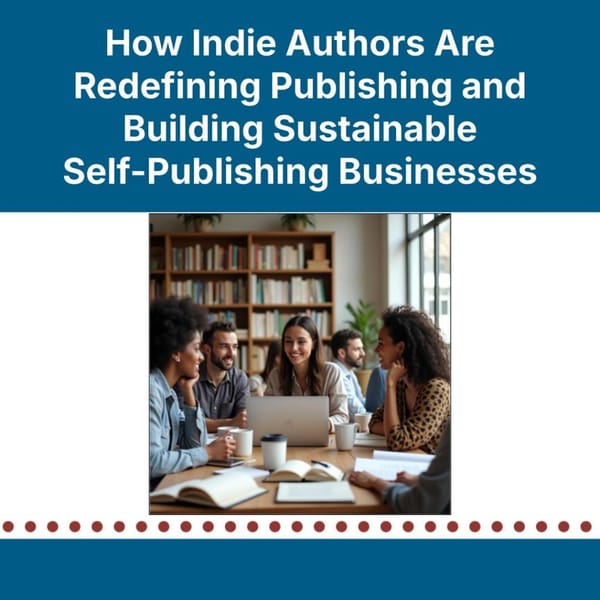Not being ready versus feeling like an imposter
There is a big difference between being unprepared for going full time and feeling like an imposter. Imposter syndrome is natural when you find success in publishing. Indeed, when you’ve done things the indie way and have learned by doing, it can all feel like dumb luck. However, not planning would be choosing to not be ready as best as you could for such a significant life change.
Know this. If you make over $10,000 a year from publishing, you’re in the top 20% of the industry. Of course, that isn’t enough to go full-time, but it gives you a benchmark. If you find that you consistently make five to ten thousand a month from your existing backlist and new releases, you’re now in the rarified air of the top one percent of published authors.
Once you earn your living from your writing, you’ll officially be a professional author. The definition of a professional is someone that makes a living from a particular occupation. What’s even more important is that the marketplace has validated your success. Real people are voting with their wallets that they want you to dedicate more time to writing.
Indie Author Magazine introduces a new section this month with the addition of INSIDER INSIGHTS. We welcome Joe Solari, noted business expert as our inaugural contributor.
If you’re an author who has published enough books to know that you have a readership and earn nearly enough or more than you do at a day job, then there are a few things to consider before you leap into becoming a professional writer. If you’re not at that place yet, then as you read on, imagine how to put processes in place so that you may be ready to go full time sooner.
There are more authors than ever becoming full-time professional writers. I can attest to the growing membership because I work with fourteen authors as their business manager. This group of authors collectively brings in eight million dollars in royalties a year. Only one has a formal education in writing, and all of them started from zero.
Every one of those authors faced the decision to make writing a profession and publishing their business. All of them would tell you it was a scary decision, as they thought the success of their books was a fluke and could end. Even a lousy job seemed to have more certainty than becoming an entrepreneur that sells stories.
Mistakes will be made
Here are the most common issues I’ve observed with authors who leap into full-time writing without a plan.
- Squeezed in a cash flow crunch
One of the main reasons high net worth authors engage my services is they suddenly find themselves in a cash flow crunch. The business now has higher employee expenses (you) constraining growth. They continue to grow at the rate they had in the past. Suddenly, they find they are out of cash. A better way to put it is the money they have is supporting them or out on the street working for them. Without a plan, your business will abruptly reset its growth rate, rather than you doing it in a planned way.
- Overpaying in taxes or underpaying/not paying taxes
An improperly set up company will cause an inefficient tax situation. Ignorance of growing tax liabilities can lead to underpaying taxes. Both cases can lead to you not having cash for the day-to-day or being surprised by a big tax bill.
- Overwhelmed and stressed by business stuff
Remember, I framed this as writing is your profession, and publishing is your business. Indie publishing is a powerful business model that eliminates intermediaries who suck up the value that should go to the reader or writer. In cutting them out, you have more responsibility. Even if you end up outsourcing this work, you’re responsible for seeing it's done right and on time. You’ll always need to be the conductor as you move from a one-man band to an orchestra. This can get stressful without a process.
There are other pitfalls, but these are the most common. So how do you do this differently to sidestep the most common mistakes?
Assess and execute
Below are the four principal areas of investigation. To make this easier and get granular in each area, I’ve created a checklist in Notion. It’s free and doesn’t require any sign-up. (If you are not familiar with Notion, it’s a free productivity software, and you can copy my checklist over to your own account.)
- Getting your house in order
In the end, all of this is about you earning a living at writing similar or better than you are now. We need to make sure that your business can support your lifestyle and optimize it as best as possible. You need to have a deep understanding of personal costs and minimize your monthly cash flow needs. Author income has huge swings associated with launches, and the smaller your backlist, the more launches or lack of will affect your monthly income.
- Getting your business in order
If you’ve already set up a company, you may need to tidy up some things before leaving your job. If you don’t have a company set up, then you need to have a company chartered where you live. Proper tax structuring, liability protection, and payroll need to be in place.
You also need to review your additional business costs now that you’re responsible for things your current employer may pay for or subsidize.
- Transitioning
After reading this, don’t tell your boss to take your job and shove it. Do this on your schedule. There needs to be a transition plan. For example, if part of your strategy is to have penalty-free access to retirement funds as a cushion or working capital (see Runway), you need to have things in place for a seamless transition. You’ll need a solo 401K set up with loan provisions to transfer your company 401K over to before you take a loan. If you leave your company with a loan from your 401K, you’re obligated to pay it back in full or pay the penalty and taxes when you leave your job.
- Runway
Some authors find themselves no longer having a day job or can’t wait until the revenues are there to support them. Your publishing business has officially taken off when it can cover its expenses and your living expenses. Until then, it’s taxiing down the runway. Your runway is the savings that must cover the difference between what you need to live and what the business provides.
A quick way to figure out how many months of runway you have is to divide your savings by your monthly living expenses. That will show you the number of months before the runway ends.
If your business doesn’t take off before the runway runs out, it crashes. Think about your runway in two ways. There is the business runway and then your runway. If things are tight on the personal side, you’ll not have any extra cash if the business needs an infusion. To protect yourself, plan the longest runway possible, even if it means waiting to taxi towards full-time writing.
As you work through the checklist, you’ll see there are many facets to explore before you hit the eject button. Go through that list and create a plan to execute over six to nine months.
Making the plan and then executing it is the secret to eliminating the stress and uncertainty that typically comes with this big life decision. Done right, you’ll conclude this was the best choice for your sanity and your family’s prosperity.











